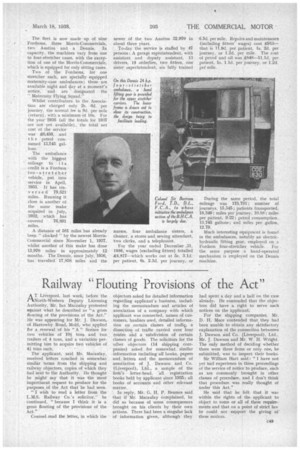Railway "Flouting Provisions of the Act"
Page 87

If you've noticed an error in this article please click here to report it so we can fix it.
AT Liverpool, last week, before the North-Western Deputy Licensing Authority, Mr. Ian Macaulay protested against what he described as "a gross flouting of the provisions of the Act." He was appearing for Mr. J. Dawson, of Harrowby Road, Mold, who applied tor a renewal of his "A " licence for two vehicles of 10i tons and two trailers of 4 tons, and a variation permitting him to acquire two vehicles of
41i tons each.
The applicant, said Mr. Macaulay, received letters couched in somewhat similar terms from the shipping and railway objectors, copies of which they had sent to the Authority. He thought he might say that it was the most impertinent request to produce for the purposes of the Act that he had seen.
"1 wish to read a letter from the L.M.S. Railway Co.'s solicitor," he continued, " because I think it is a gross flouting of the provisions of the Act."
Counsel read the letter, in which the
objectors asked for detailed information regarding applicant's business, including the memorandum and articles of association of a company with which applicant was connected, names of customers, hauliers used detailed information on certain classes of traffii, a dissection of traffic carried over four routes and a subdivision of certain classes of goods. The solicitors for the other objectors (14 shipping companies) asked for somewhat • similar information including all books, papers and letters and the memorandum of association of J. Dawsou and Co. (Liverpool), Ltd., a sample of the firm's letter-head, -all registration books held by applicant since 1935; all books of accounts and other relevant matter.
In reply, Mr. G. H. P. Beames said that if Mr. Macaulay complained, he did so because of some consequences brought on his clients by their own actions. There had been a singular lack of information given, although they had spent a day and a half on the case already. He contended that the objectors did have a right to serve such notices on the applicant.
For the shipping companies, Mr. D. II, Mace contended that they had been unable to obtain any siitisfactory explanation of the connection betweeen J. Dawson and Co. (Liverpool), Ltd., Mr. J. Dawson and Mr, W. H. Wright. The only method of deciding whether there were three firms or only one, he submitted, was to inspect their books.
Sir William Hart said: "I have not yet had experience in these proceedings of the service of notice to produce, such as are commonly brought in other classes of procedure, and I don't think that procedure was really thought of under this Act."
fie said that he felt that it was within the rights of the applicant to object to some or all of these requirements and that on a point of strict law he could not support the giving of these notices.












































































































































